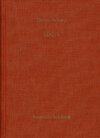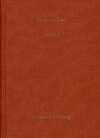Antoine Louis Claude Destutt de Tracy: Grundzüge einer Ideenlehre / Band III: Logik
von Antoine Louis Claude Destutt de Tracy, herausgegeben von Hans Jörg Sandkühler, aus dem Französischen übersetzt von Claus Sonnenschein-WernerIn 1805, Destutt de Tracy's ›Logic‹ was published as volume three of his ›Eléments d'idéologie‹. The fundamental difference between this volume and the first volume was the detailed discussion on the history of logical ideas. He was scathingly critical of those precursors who in his opinion were the most significant – Aristoteles, Bacon, the »men of Port-Royal«, Descartes, Locke, Hobbes, Condillac and Buffier – from the perspective of his sensualistic-naturalistic ideology, and above all of Aristotelian syllogistic and the German tradition of apriorism. Previously logic had been misunderstood as »the art of reasonable thinking«. He believed it should become the »first science« and should consist solely of the analysis of the development and deduction of our ideas. It is only in this way that logic can guarantee the recognition of the characteristics of truth and certainty as well as of the causes of uncertainty and error. On the whole, this logic, which is at the same time an autobiographical account of the path to ideology, is a plea against skepticism.








